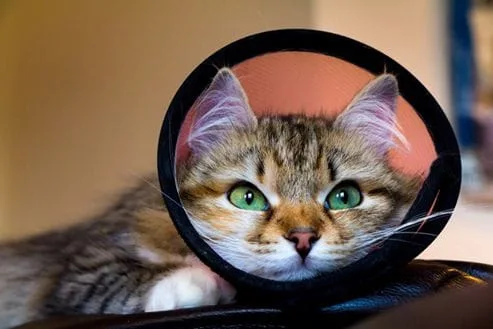According to a recent report released by the American Humane Society, animal shelters across the country euthanize 2.4 million healthy dogs and cats each year due to pet overpopulation. No one steps forward to adopt these animals in the organization’s time limit and a staff member has to euthanize him or her to make room for other homeless pets. This equates to one healthy animal losing his or her life every 13 seconds in America alone. While this is a sad and frustrating statistic, it’s also preventable with spay or neuter surgery. Neutering a male pet means he can’t impregnate a female while a spay surgery in females renders them infertile.
Here at Brookside Veterinary Hospital we offer laser surgery for all of our spays and neuters, at no charge to you. This sets us aside from other hospitals who commonly use a scalpel blade to make their incisions and cuts. The benefits of laser surgery are less pain, less bleeding, less chance of an infection, and shorter hospital stays, proven!
What Happens During a Spay or Neuter Surgery
Patients should be fasted from food and water for about 8 hours before coming into the veterinary hospital for surgery. This helps to reduce the chance of aspiration if the pet vomits during or after anesthesia. Our staff will provide the authorization form(s) upon intake morning of surgery. All patients must stay at the hospital for a minimum of 4 hours after surgery has been completed, most patients can go home the same day of surgery! Most patients do not need to use an E-collar (cone of shame) after their spay or neuter surgery. If your pet licks their incision or bites at their incision, please call us so we can provide you with an E-collar or you can purchase one at a local pet supply store.
The first thing a veterinarian does when a female pet undergoes spay surgery is to provide her with sedation then anesthesia to put her into a deep sleep. The veterinarian then removes the ovaries and uterus through an opening in the dog or cat’s abdomen.
After a male pet has received sedation and anesthesia for a neuter surgery, the veterinarian makes a small cut in the front of his scrotum. The veterinarian then removes each testicle and ties off the vas deferens that produces its blood supply.
Veterinary staff carefully monitors a pet’s heart rate, blood pressure, body temperature, and breathing rate throughout the procedure. They also provide pet owners with home care instructions once the pet is ready to go home at the end of the day. All patients receive an intravenous catheter and IV fluids during their procedure to ensure blood pressure stays adequate while rehydrating.
Benefits of Spaying-
An unaltered female cat may go through several heat cycles each year. Intact female dogs usually go into heat two times each year. A cat becomes fertile well before she reaches one year old, which means she could produce dozens of litters of kittens during her lifetime. Cats in heat have loud vocalizations and can act aggressively to try to gain the attention of male cats. We will spay cats at 6 months (over 5.5 lbs) or older. All spay services come with pain medication and antibiotics. Sutures will need to be removed 14 days after surgery.
Spaying a dog reduces her desire to roam free. If an unneutered neighbor male dog gets near a spayed female dog, he won’t attempt to mate with her. In addition to preventing litters of puppies and kittens that may not find a home, spaying a cat or dog decreases her risk of developing uterine, ovarian, and mammary gland cancer. The risk decreases the most for dogs and cats who have the surgery before they would have gone into heat for the first time. We will spay a dog at 8 months or older. All spay services come with pain medication and antibiotics. Sutures will need to be removed 14 days after surgery.
Benefits of Neutering
We will neuter male dogs at 8 months or older. We will neuter male cats at 5-6 (5.5 lbs) months or older. All neuter services come with pain medication and antibiotics. Sutures will need to be removed 14 days after surgery for male dogs.
Both dogs and cats can engage in aggressive behavior and roaming when they have not yet undergone the neutering procedure. The aggressiveness can surprise their human family when the dog attempts to bite or even act in a sexual manner towards people. Unneutered pets also spray their urine to claim a territory as their own. This odor is not only extremely unpleasant, it can be difficult to eliminate as well. After neutering surgery, the risk of testicular or prostate cancer in male pets drops significantly.
Neutering or spaying a pet increases his or her lifespan by an average of three to five years. One last thing to consider is that people with altered pets make better neighbors and are less likely to encounter the dangers of roaming because their pets are much more likely to remain in the home or yard.
Call us at 231-263-7387 with any questions you have about spaying or neutering your pets with Brookside Veterinary Hospital


